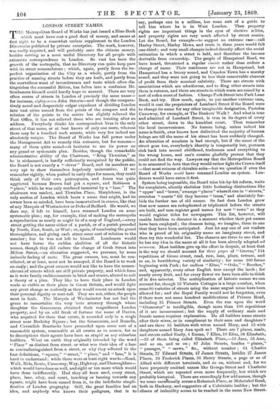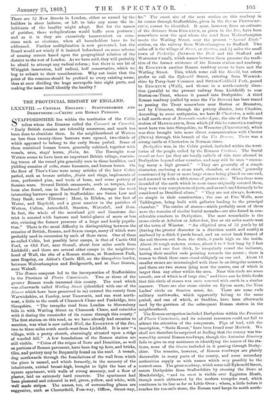LONDON STREET NAMES. LONDON STREET NAMES.
THE Metropolitan Board of Works has just issued a Blue-Book which must have cost a good deal of money, and seems at first sight to be a somewhat useless supplement to the London Directories published by private enterprise. The work, however, was really required, and will probably save the citizens money, besides serving as a most useful Directory for all people with extensive correspondence in London. So vast has been the growth of the metropolis, that no Directory can quite keep pace with its street nomenclature ; which, again, partly from the imperfect organization of the City as a whole, partly from the practice of naming streets before they are built, and partly from the marvellous want of inventiveness and taste which often distinguishes the successful Briton, has fallen into a confusion Mr. Scudamore himself could hardly hope to unravel. There are very often scores of streets in London of precisely the same name— for instance, eighty-seven John Streets—and though the comparatively novel and desperately vulgar expedient of dividing London into vast cities named from the points of the compass and the relation of the points to the centre has slightly relieved the Post Office, it has not relieved those who are hunting after an address. Everybody thinks his correspondent lives in the only street of that name, or at best knows of only one more, whereas there may be a hundred such streets, while very few indeed are absolutely unique. The Board of Works has full power under the Management Act to remedy this nuisance, but for reasons— many of them quite sound—it hesitates to use its power on any grand or systematic plan. Besides, though the remarkable administrative ability of the Chairman, "King Thwaites," as he is nicknamed, is hardly sufficiently recognized by the public, the Board is not exactly a " clever " Board, and its members are very apt to show themselves hopelessly uninventive. If we remember rightly, when pushed in early days for names, they could think only of their own patronymics, and Jones was quite aggrieved because Brown had got a square, and Robinson a " place," while he was only rendered immortal by a " lane." The chairman was modest, and Thwaites Place, Marylebone, is the only section of London which bears a name that might, had its owner been so minded, have been immortalized in stucco, like that of any Marquis of Westminster or Duke of Bedford. He would, we dare say, if left to himself, have renamed London on some systematic plan ; say, for example, that of making the metropolis a reproduction as nearly as might be of a map of England,—every street getting the name either of a parish, or of a parish preceded by North, East, South, or West; or, again, of numbering the grand thoroughfares, and giving each street some sort of relation to the number ; but he was not left to himself. Londoners would not have borne the sudden abolition of all the historic names, though they did endure the change of Grub Street into Milton Street,—an alteration suggested, we presume, by some imbecile feeling of caste. The great owners, too, must be conciliated, or at least, must not be annoyed, if the Board is to work on easily ; and the great owners would not like to have the nomenclature‘of streets which are still private property, and which form as it were family ernblazonments in brick and stucco, altered to suit a theory or a plan. They like to have their place in London made as visible as their place in Great Britain, and would fight any great change as zealously as they would resent an attack upon their personal dignity or rent-roll. They are not, either, the people most in fault. The Marquis of Westminster has not had the grace to immortalize the very 'cute attorney through whose daughter the Grosvenors obtained their magnificent London property, and by an odd freak of fortune the name of Davies, who acquired for them that estate, is recorded only in a single street near Berkeley Square ; but the Grosvenors, and Russells, and Cavendish Bentincks have proceeded upon some sort of a
reasonable system, reasonable at all events as to names, for as to descriptions their agents have been as stupid as any suburban builders. What on earth they originally intended by the word " Place" as distinct from street, or what was their idea of a lane as contradistiuguished from a street, or why they adhered to the four definitions, " square," " street," " place," and "lane," it is hard to understand ; while there were at least eight words—Road, Walk, Ride, Route, Causeway, Way, Highway, andThoroughfarewhich would have done as well, and eight or ten more which would have done indifferently. Had they all been used, every street, place, lane, alley, and court, touching or bearing towards any square, might have been named from it, to the indefinite simplification of London geography. Still, the great families had an idea, and anybody who knows their pedigrees, that is to
say, perhaps one in a million, has some sort of a guide to tell him where he is in West London. Then property rights are important things in the eyes of elective relies, and property rights are very much affected by street names. Let the Board, for example—to suggest an extreme case—call Harley Street, Harley Mews, and rents in three years would fall one-third ; and very small changes indeed directly affect the social estimation in which a street is held, and therefore the income derivable from ownership. The people of Hampstead Road, we have beard, threatened a regular imeule rather than endure a chango of name. Their residences arc not in Hampstead, but Hampstead has a breezy sound, and Camden Town has a marshy sound, and they were not going to lose their conceivable chances of profit from their nominal salubrity. There are streets with associations which are odoriferous, and to fling other streets into them is ruinous, and there are streets in which rents are raised by a sort of reflex scent of fashion. Change Park Street into Park Lane Back, and try. How much, again, to put another extreme case, would it cost the proprietors of Lombard Street if the Board were to change its name for any other imaginable designation, Pactolus Causeway, for example, or The Bankers' Walk? And what is true and admitted of Lombard Street, is true in its degree of every other street, down to the humblest court. Then remember the local inconvenience. No human being, unless indeed his name is Smith, ever knows how dullwitted the majority of human beings are till the name of his street has been suddenly changed. An alteration of numbers is bad enough, but if the name of the street goes too, everybody's identity is temporarily lost, postmen sink back into second childhood, tradesmen send everything to the wrong house, and one's cousins gleefully protest that they could not find the way. Lawyers say that the Metropolitan Board is so armoured in Acts that they would rather fight the Crown itself —that most ruinous of chivalric suits—but we question if even the Board of Works could have renamed London on system. Londoners would have eaten it first.
System being impossible, the Board tries bit-by-bit reform, waits for complaints, silently abolishes little bothering distinctions like " upper" and "lower," swamps " places" where it can in " streets," stretches " courts" till they become " lanes," and absolutely forbids the further use of old names. So fast does London grow that new names are reduplicated or triplicated before the streets are built, and men register good names for new " rows" as they would register titles for newspapers. This list, however, will enable builders to discover in a moment whether their pet names have been employed ; the chances being, we imagine, three to one that they have been anticipated. Just let any one of our readers who is proud of his originality name an imaginary street, and then try this wonderful list. The chances are three to one that if he has any idea in the name at all it has been already adopted ad nauseam. Most builders give up the effort in despair, at least that is the way we should account for three pages of " Groves," 134 repetitions of Grove street, road, row, lane, place, terrace, and so on, in bewildering variety of similarity ; for some 200 formsbeginning with Park ; for endless " Elms," " Oaks," " Beeches," and, apparently, every other English tree except the larch ; for nearly every fruit, and for every flower we have been able to think of in five minutes. The multiplication of historic names we can account for, though 13 Victoria Cottages is a large number, when some 80 varieties of streets using the same august name have been allowed for ; and the Royal Family would not be forgotten, even if there were not some hundred modifications of Princes Road, including 35 Princes Streets. Even the run upon the word " Gloucester" is intelligible, though more than 100 repetitions of it are inconvenient ; but the supply of ordinary male and female names requires explanation. Do all builders name streets after their wives, or in compliment to their sons and daughters ? and are there 35 builders with wives named Mary, and 13 with daughters named Mary Ann spelt so? There are 7 places, roads, and streets called Emily, 4 Emma, 7 Ellen, 10 Eliza, 58 Elizabeth, —23 of them being called Elizabeth Place,-13 Jane, 53 Ann, and so on, and so on ; 87 John Streets, besides " places," " passages, " " mews, " &c., without number ; 64 Charles Streets, 37 Edward Streets, 47 James Streets, besides 27 James Places, 24 Frederick Places, 36 Henry Streets, a page or so of Alfred with different terminals, and so on, without end, for we have purposely omitted names like George Street and Charlotte Street, which are repeated even more frequently, but which are probably historical. There are exceedingly few odd names, though we come occaionally across a Ruhamah Place, or Mehetabel Road, both in Hackney, and suggestive of a Calvinistic builder ; but the climax of imbecility seems to be reached in the name New Street.
There are 52 New Streets in London, either so named by the builders in sheer laziness, or left to take any name the inhabitants of the locality might adopt. But for the names of parishes, these reduplications would baffle even postmen ; and as it is they are excessively inconvenient on occasions such as elections, when all householders have to be addressed. Further multiplication is now prevented, but the Board would act wisely if it insisted beforehand on some scheme of naming streets based upon the geographical relation of the district to the rest of London. As we have said, they will probably be afraid to attempt any radical reform ; but there is one bit of Whiggish innovation, half radical, half conservative, which we beg to submit to their consideration. Why not insist that the point of the compass should be prefixed to every existing name, thus at once dividing the huge metropolis into eight parts, and making the name itself identify the locality ?



































 Previous page
Previous page